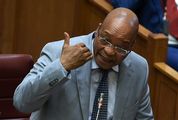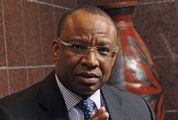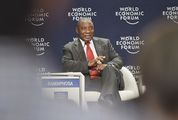Source:

BUSINESS DAY TV: Attacks ‘raised long-held resentment towards SA’
by Transcript services, April 28 2015,
2015-04-29 18:47:24.0
DIANNA Games is the CEO of Africa@Work.
BUSINESS DAY TV: Tensions between SA and Nigeria are rising after Nigeria recalled its high commissioner and its deputy for consultations after the recent spate of xenophobic attacks. However, Nigeria said the two were free to return to its mission in SA once the consultations were over. SA’s response was pretty damning but has it been blown out of proportion and what are the implications for companies operating in that West African country? Joining us with her view is Dianna Games, CEO of Africa@Work.
Dianna, do you think it has been blown out of proportion and that it’s a storm in a teacup that’s been created here?
DIANNA GAMES: I don’t know if it’s a storm in a teacup per se, but what it is, is there have been emotions that have been running very high because the attacks on foreigners have raised long-held resentments towards SA by Nigerians and, of course, other nations, where people, Nigerians, feel that South Africans have not really appreciated the role that they’ve played in fighting apartheid and since 1994 they’ve been treated with suspicion and sometimes with aggression by, for example, police and so on. And I think there’s always a feeling that perhaps SA has not been truly grateful or shown enough gratitude and we certainly haven’t seen the kind of diplomatic activity and closeness under the Zuma administration and the Jonathan administration, the two of them together. And we really saw this with the church collapsing and the many South Africans who died. The response seemed to be fairly inadequate from the Nigerian side ... so at this stage it looks like we’ve both got a different axe to grind. I do think that this does raise an opportunity possibly to resolve this because there is an incoming new administration in Nigeria from the end of May.
BDTV: We in fact had the Minister and the Presidency Jeff Radebe saying this morning that SA still has very “cordial relations” with Nigeria and (President) Jacob Zuma has been invited to attend their inauguration of the Nigerian President-elect Muhammadu Buhari, will that be quite an important diplomatic occasion for SA and Nigeria to possibly mend fences?
DG: It will certainly be a good opportunity for the two countries. This is not the best time to mend fences given that the president-elect of Nigeria has a lot on his plate, but I certainly think it’s a good place to start and hopefully the conversation between the two presidents will possibly be more frank and more honest than it has been in the past, and perhaps deal more with some of the issues between the two countries because of what’s happened. It almost opens a window of opportunity for more frank discussion. So I would think that there is a good opportunity going forward yes.
BDTV: (Have) SA and Nigeria actually had (a) really close relationship and is it important for them at the opposite ends of the continent?
DG: Well yes they have ... if you look at the president (Olusegun) Obasanjo and president (Thabo) Mbeki, when they were both presidents ... of course the two men knew each other from before they were heads of state and used their friendship and their strength as the two biggest economies in Africa even way back then, to really push the African agenda together ... and because both are pivotal states in their regions, they are the biggest economies and the biggest political players in Africa, so it’s certainly very important that they work together. Because certainly now we’re seeing the two countries arguing, it’s unseemly for a start, but, secondly, it is not good for the concept of pulling Africa forward. It needs some kind of proper leadership.
BDTV: Do you think there has actually been any economic fallout as far as trade relations are concerned, between SA and Nigeria or even just companies working in both regions, mainly South African companies working in Nigeria ... do you think they’ve suffered any sort of backlash since the xenophobic attacks and the subsequent verbal spats that have come to the fore over this past weekend?
DG: There’s no doubt that really the only South African target in Nigeria as in many other African countries is South African business because we don’t have hundreds or thousands of economic refugees in other African countries in the same way that we host a lot of them here. So the profile is very different and the business is the key sort of face of SA and particularly the consumer-facing brands such as MTN and Shoprite. So you will always (see) those names come up ... when there is talk of a backlash. And there’s been talk of boycotts I don’t know whether that’s been effective, a lot of this will die down, a lot of it was about making a strong point to the South Africans and not just the government. There is a sense of SA ... people are not breaking it down.
BDTV: If you look at trade between SA and Nigeria, it looks pretty small, if you strip out the oil equation, but we were talking about companies, and it seems to be a very important destination for South African companies that have no more growth at home and are looking to expand as the biggest economy, and the biggest population in Africa?
DG: There’s no doubt that there is a lot of South African interest in Nigeria. Many of our biggest listed companies are there, a lot of our money is going from SA, funding projects and things in Nigeria, a lot of our skills are going there to build projects, roads, etc, so there’s a lot of interaction between the two countries. One of the issues that a lot of people raise, is the fact that there are very few Nigerian investors in SA. I’m talking investment ... company investment, because there are a lot of individual investors in terms of property in other areas. For me, it’s an economic reality ... Nigeria is a huge market, it has huge market gaps, which is why our companies are there to exploit those gaps and it doesn’t really make sense for Nigerians to come here to invest simply to balance the books as it were. I do think that South Africans are maybe not seeing enough opportunity in different ways of interacting with Nigerian business because there is a lot of money in Nigeria, people looking to invest possibly in SA, but not if they don’t feel welcome here. They will not put their money on the JSE, into companies here, into funds, private funds and so on ... there’s a lot more that could be done and in a less traditional way possibly.
BDTV: Hopefully maybe with the inauguration of the new president that might happen....
DIANNA Games is the CEO of Africa@Work.
BUSINESS DAY TV: Tensions between SA and Nigeria are rising after Nigeria recalled its high commissioner and its deputy for consultations after the recent spate of xenophobic attacks. However, Nigeria said the two were free to return to its mission in SA once the consultations were over. SA’s response was pretty damning but has it been blown out of proportion and what are the implications for companies operating in that West African country? Joining us with her view is Dianna Games, CEO of Africa@Work.
Dianna, do you think it has been blown out of proportion and that it’s a storm in a teacup that’s been created here?
DIANNA GAMES: I don’t know if it’s a storm in a teacup per se, but what it is, is there have been emotions that have been running very high because the attacks on foreigners have raised long-held resentments towards SA by Nigerians and, of course, other nations, where people, Nigerians, feel that South Africans have not really appreciated the role that they’ve played in fighting apartheid and since 1994 they’ve been treated with suspicion and sometimes with aggression by, for example, police and so on. And I think there’s always a feeling that perhaps SA has not been truly grateful or shown enough gratitude and we certainly haven’t seen the kind of diplomatic activity and closeness under the Zuma administration and the Jonathan administration, the two of them together. And we really saw this with the church collapsing and the many South Africans who died. The response seemed to be fairly inadequate from the Nigerian side ... so at this stage it looks like we’ve both got a different axe to grind. I do think that this does raise an opportunity possibly to resolve this because there is an incoming new administration in Nigeria from the end of May.
BDTV: We in fact had the Minister and the Presidency Jeff Radebe saying this morning that SA still has very “cordial relations” with Nigeria and (President) Jacob Zuma has been invited to attend their inauguration of the Nigerian President-elect Muhammadu Buhari, will that be quite an important diplomatic occasion for SA and Nigeria to possibly mend fences?
DG: It will certainly be a good opportunity for the two countries. This is not the best time to mend fences given that the president-elect of Nigeria has a lot on his plate, but I certainly think it’s a good place to start and hopefully the conversation between the two presidents will possibly be more frank and more honest than it has been in the past, and perhaps deal more with some of the issues between the two countries because of what’s happened. It almost opens a window of opportunity for more frank discussion. So I would think that there is a good opportunity going forward yes.
BDTV: (Have) SA and Nigeria actually had (a) really close relationship and is it important for them at the opposite ends of the continent?
DG: Well yes they have ... if you look at the president (Olusegun) Obasanjo and president (Thabo) Mbeki, when they were both presidents ... of course the two men knew each other from before they were heads of state and used their friendship and their strength as the two biggest economies in Africa even way back then, to really push the African agenda together ... and because both are pivotal states in their regions, they are the biggest economies and the biggest political players in Africa, so it’s certainly very important that they work together. Because certainly now we’re seeing the two countries arguing, it’s unseemly for a start, but, secondly, it is not good for the concept of pulling Africa forward. It needs some kind of proper leadership.
BDTV: Do you think there has actually been any economic fallout as far as trade relations are concerned, between SA and Nigeria or even just companies working in both regions, mainly South African companies working in Nigeria ... do you think they’ve suffered any sort of backlash since the xenophobic attacks and the subsequent verbal spats that have come to the fore over this past weekend?
DG: There’s no doubt that really the only South African target in Nigeria as in many other African countries is South African business because we don’t have hundreds or thousands of economic refugees in other African countries in the same way that we host a lot of them here. So the profile is very different and the business is the key sort of face of SA and particularly the consumer-facing brands such as MTN and Shoprite. So you will always (see) those names come up ... when there is talk of a backlash. And there’s been talk of boycotts I don’t know whether that’s been effective, a lot of this will die down, a lot of it was about making a strong point to the South Africans and not just the government. There is a sense of SA ... people are not breaking it down.
BDTV: If you look at trade between SA and Nigeria, it looks pretty small, if you strip out the oil equation, but we were talking about companies, and it seems to be a very important destination for South African companies that have no more growth at home and are looking to expand as the biggest economy, and the biggest population in Africa?
DG: There’s no doubt that there is a lot of South African interest in Nigeria. Many of our biggest listed companies are there, a lot of our money is going from SA, funding projects and things in Nigeria, a lot of our skills are going there to build projects, roads, etc, so there’s a lot of interaction between the two countries. One of the issues that a lot of people raise, is the fact that there are very few Nigerian investors in SA. I’m talking investment ... company investment, because there are a lot of individual investors in terms of property in other areas. For me, it’s an economic reality ... Nigeria is a huge market, it has huge market gaps, which is why our companies are there to exploit those gaps and it doesn’t really make sense for Nigerians to come here to invest simply to balance the books as it were. I do think that South Africans are maybe not seeing enough opportunity in different ways of interacting with Nigerian business because there is a lot of money in Nigeria, people looking to invest possibly in SA, but not if they don’t feel welcome here. They will not put their money on the JSE, into companies here, into funds, private funds and so on ... there’s a lot more that could be done and in a less traditional way possibly.
BDTV: Hopefully maybe with the inauguration of the new president that might happen....



















Login OR Join up TO COMMENT